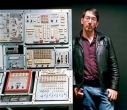Wright: I'm uncollecting. I buy collections on eBay, and I disperse them out to people again. I have to be like an entropic force to collectors, otherwise all of this stuff will get sorted. It's like the opposing force, uncollectors.
All of these things are collections of weird stuff. I go to estate sales and pick up collections from people who got tired of collecting. It's just a hobby. It's fun." He has alot of stuff uncollected so far like little dolls--souvenir dolls from cities, dice, fossils, etc. Wright: "I don't spend much on it. It's always really cheap stuff. I've been spending my real money on Russian space hardware.
Lately, Wright is spending a lot of time satisfying his curiosity in his latest obsession: the Russian space program. He's begun collecting parts from the training replicas of the Space Station Mir and other Russian spacecrafts. "I got really interested in the Russian space program and the way they design things, so I started collecting this stuff. His collection includes control systems computers, navigation panels and even a Russian space hammer. "In Russia, it's legal to own this stuff; for NASA, it's not. A lot of the people who worked on the space program somehow acquired this officially," he said.
Some of the objects are landing in EBay, where Wright spent $1,700 for a navigation panel. Wright is not sure what he'll do with the collection. Currently, he spends time on the Internet and reads about the Russian space program.
 Wright: "The biggest thing I have right now is the external hatch off a Russian space shuttle. It's about four feet in diameter and about 100 pounds and have it leaning against a wall in our stairwell. And I have a seat from the Soyuz. That's also pretty big. Some of the Mir control panels get pretty large. And I have a Soyuz hatch, which is a little smaller. It's about three feet high." His prized possession: a global astrogator, a navigational computer with a tiny spinning globe inside. Wright appreciates the stuff as much for the science behind it as for the history. "We turned our noses up at the Russians," he says, "but I admire their approach to engineering and what they managed to do in space." Wright: "The biggest thing I have right now is the external hatch off a Russian space shuttle. It's about four feet in diameter and about 100 pounds and have it leaning against a wall in our stairwell. And I have a seat from the Soyuz. That's also pretty big. Some of the Mir control panels get pretty large. And I have a Soyuz hatch, which is a little smaller. It's about three feet high." His prized possession: a global astrogator, a navigational computer with a tiny spinning globe inside. Wright appreciates the stuff as much for the science behind it as for the history. "We turned our noses up at the Russians," he says, "but I admire their approach to engineering and what they managed to do in space."
| 
